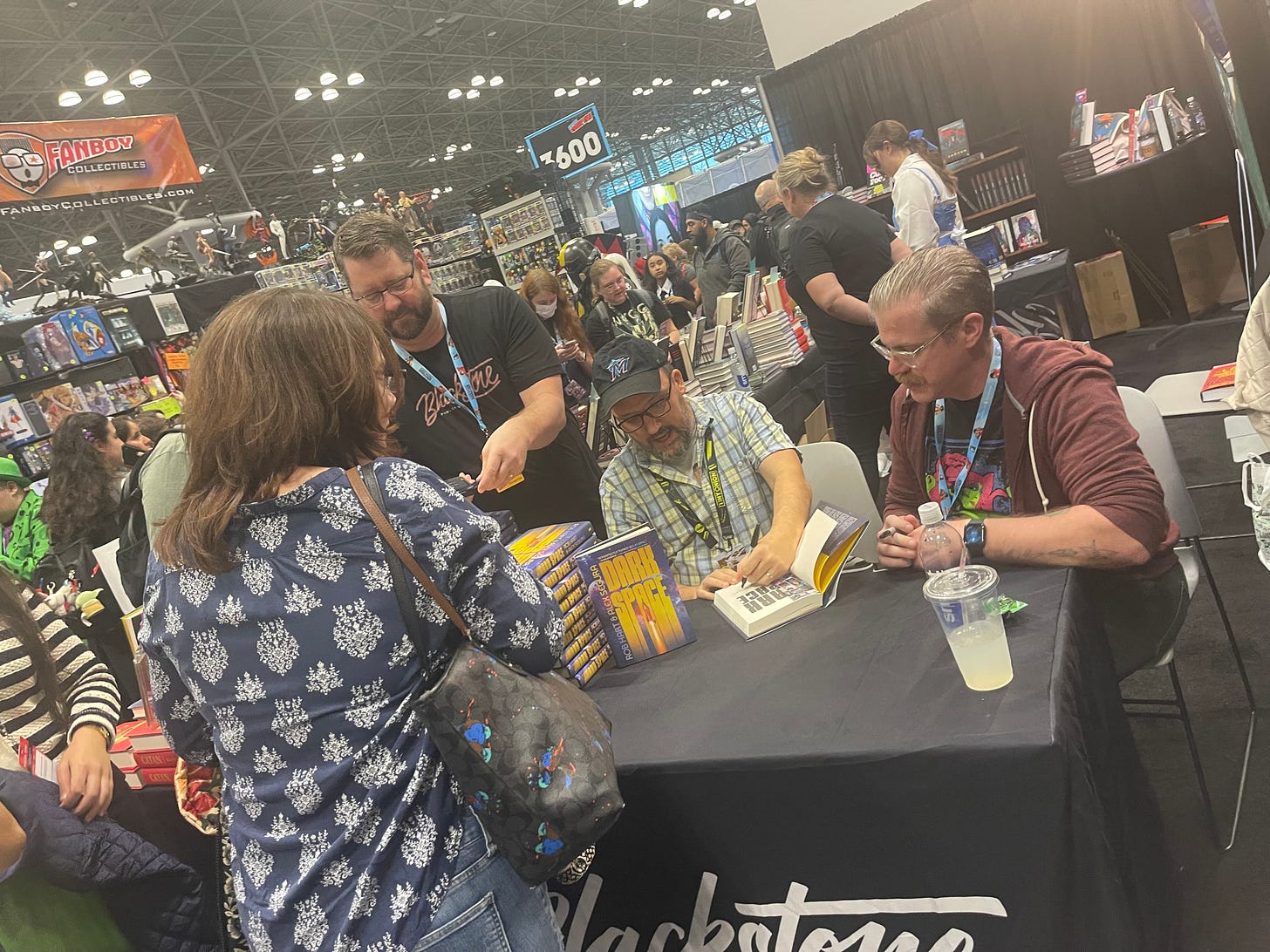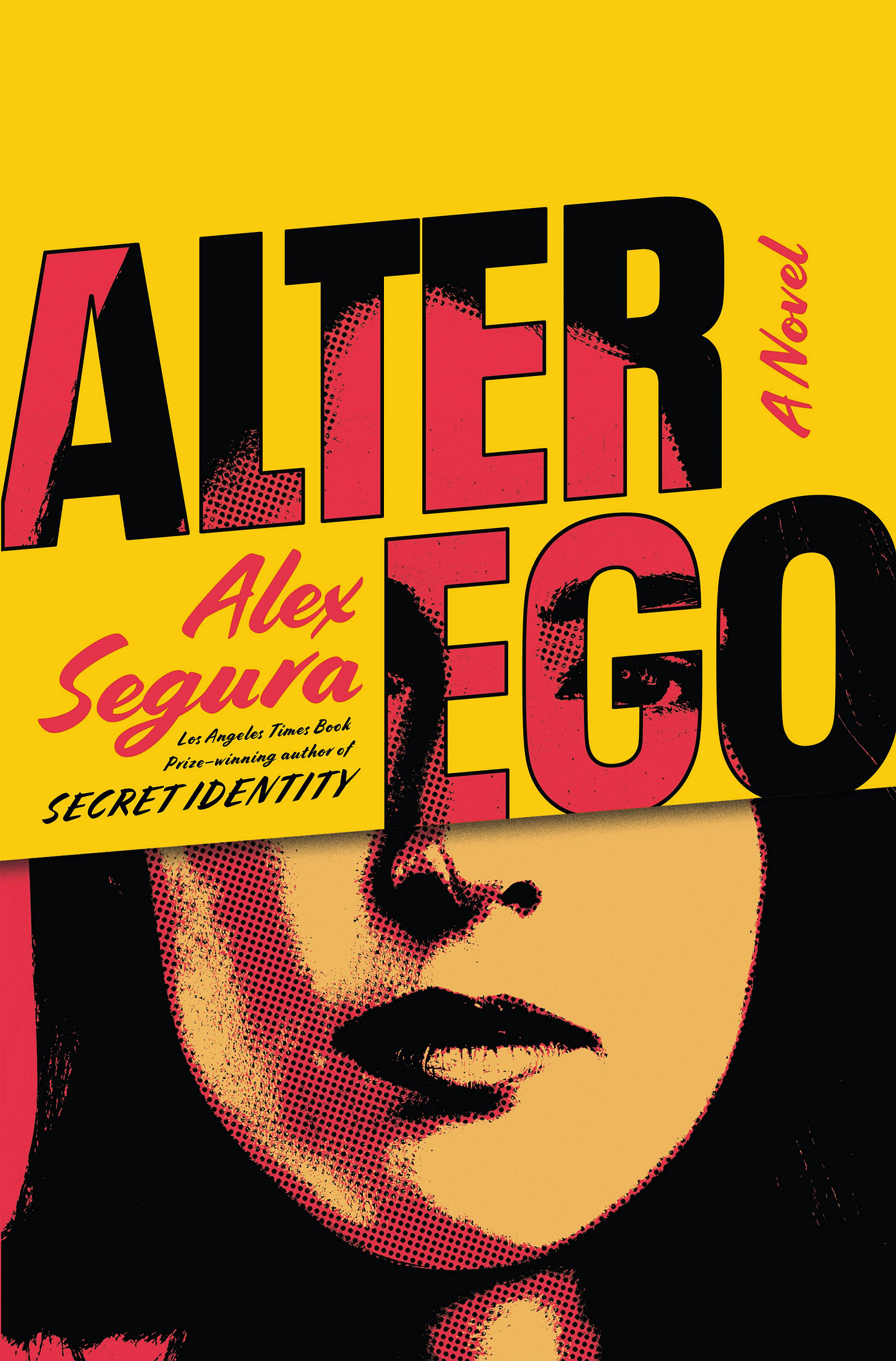Alex Segura on the Secret Identity-verse, his dream project, and his latest novel, ALTER EGO
An interview with the man, the myth, the legend... Alex!
I remember when
told me his plans for Secret Identity, a murder mystery set in the world of comics. It’s a book only he could write—an accomplished mystery writer tackling an industry he had spent decades in. I’m always excited when an author injects their work with lived-in experience.And Secret Identity did not disappoint. A love letter to two entirely different genres in a neat, pulse-pounding package.
Alex and I have been pals and co-writers for a while now, so we’re constantly bouncing stuff off each other. I remember reading the pitch for Alter Ego and it struck me as an incredibly smart continuation of what he did in the first book; it pays respect to the first story while spinning it into something entirely new.
Again, Alex did not disappoint.
Back in my LitReactor days, one of my favorite things to do was interview other authors. And I’ve been meaning to get back into the habit, so I’m glad my inaugural Substack interview is with Alex.
We wrote a comic book together, and a novel, AND spent an entire weekend at a table at New York Comic Con together, and we’re still friends, and that’s the best kind of testament to a person I could make.
Before you dig in, here’s the back of the book…
Alex Segura, award–winning author of Secret Identity, returns with a clever and escapist standalone sequel set in the world of comic books. In the present day, a comics legend is given the chance to revive a beloved but forgotten character. But at what price?
Annie Bustamante is a cultural force like none other: an acclaimed filmmaker, an author, a comic book artist known for one of the all time best superhero comics in recent memory. But she’s never been able to tackle her longtime favorite superhero, the Lethal Lynx. Only known to the most die-hard comics fans and long out of print, the rights were never available—until now.
But Annie is skeptical of who is making the offer: Bert Carlyle's father started Triumph Comics, and has long claimed ownership of the Lynx. When she starts getting anonymous messages urging her not to trust anyone, Annie’s inner alarms go off. Even worse? Carlyle wants to pair her with a disgraced filmmaker for a desperate media play.
Annie, who has been called a genius, a sell-out, a visionary, a hack, and everything else under the sun, is sick of the money grab. For the first time since she started reading a tattered copy of The Legendary Lynx #1 as a kid, she feels a pure, creative spark. The chance to tell a story her way. She's not about to let that go. Even if it means uncovering the dark truth about the character she loves.
Sharply written, deftly plotted, and with a palpable affection for all kinds of storytelling, Alter Ego is a one-of-a-kind reading experience.
ROB: At what point in the lifespan of Secret Identity did you decide you wanted to write a sequel? And how did the concept of the sequel grow and change from that point of inception?
ALEX: The very end! I think I'd turned in the revised draft to my editor, Zack Wagman at Flatiron, and he said "I think there's more here—but not in this book. Have you considered an epilogue?"
And honestly, I hadn't. But once I started thinking about what was going on in the present day, it kept rolling. It became the epilogue the novel now has, but even more—it teed me up for Alter Ego. I knew, loosely, that I wanted to tell a story, a thriller, set in the modern day, but it didn't really synthesize until Annie showed up in my mind. Then I realized we were showing the other side of the Secret Identity coin—and the parallels between a new protagonist and Carmen, and how the different eras produced different results.
What was the biggest challenge of expanding the story?
It was mostly self-imposed, if I'm being frank. There was an easier, softer path—where I just picked up where Secret Identity left off and told another historical noir mystery in comics, this time in the 80s with Carmen experiencing whatever was happening then and fighting for her ownership of the Lynx, and while that sounds kind of cool as I type it, it feels like it flies too close to the idea of Secret Identity.
I didn't want to write the same book twice, but I wanted them to feel like they existed in the same world and touched on the same themes. So a lot of the challenge of Alter Ego was trying to not repeat Secret Identity but still tell a great story that evoked it.
Both books contain a really fun and interesting mix of characters and companies that you made up, but also real-life comic book characters and industry professionals. Why not just make it all up? And how did you find the right mix, in terms of how you portrayed the historical record?
There was a fork in the road, early on in the writing of Secret Identity, where Zack said "you can either just make everything up, and nod/wink at existing companies or just lean in hard and weave your stuff through established fact," and the latter appealed to me so much more. I'm a sucker for meta stories—particularly stories that weave through actual events—James Ellroy does it really well, for example. I never really considered the "Alan Moore/ThunderMan" route—where everything is a knowing reference to something real. My rule of thumb, overall, was not to bog the books down in the "Wikipedia" of it all.
There's only one or two intentional slips—in Secret Identity, Rich Berger, Carmen's editor, goes on a long, loving speech about Neal Adams and Denny O'Neil. And the other one in Alter Ego is right at the end, so I won't spoil it. But overall, I trust readers. They're smart. They can research something if they're intrigued by it. They don't need me to recap it all. And the same goes for historical cameos. It's a tool for texture, not word count—so every time I'd find myself rattling things off for too long, my alarms would go off.
In terms of the historical record—I rarely, if ever, had actual people have speaking parts—it's not my place to put words in their mouths. That said, I can make reference to things that have been historically proven to have happened—like volleyball games with Marvel and DC staffers in Central Park, or who attended a conference. Same goes for Alter Ego, and who is on a panel or who might be at a show or whatever. That's all searchable.
It seems like, after Secret Identity and Alter Ego and the tie-in Lynx comic, that you're setting the universe down for a bit. Why now, and what would it take for you to come back?
Yes, I feel like I've said my piece, and if I keep rolling down this path, it could very easily become all I do—and I know that's not a bad thing, but I would like to write other stuff! It all boils down to the idea, though, so I've decided to never say never. If something hits me that drives me to write it, I'll do it. But for now, I'm on to the next thing.
You're constantly juggling multiple projects (like Dark Space, which we wrote together, available here!), and it's a steady mix of original and IP work. Besides money (because, money matters, kids are expensive), what gets you out of bed in the morning, in terms of investing your creative time and energy into a given project? What are you looking for?
I love creating toys and playing with cool toys that already exist—but both have to spring from a place of obsession or passion.
Obsession because I can't shake an idea or concept, passion because I have a deep-rooted love for the characters... I want to feel additive and feel like what I'm bringing to the table makes the stories stronger, whether they're mine of a classic property. If I'm not into it, it feels like work, and that's not why we got into this business.
What's the top-of-the-mountain dream project you'd drop everything to do?
Oh man, that's tough! I've gotten to write Spider-Man and Star Wars. I'd be very happy if I ever got to write an X-Men or Batman story, though. For sure.
What's the biggest misconception about you?
I'm not sure, honestly. Maybe that I'm much more introverted than I seem? My battery fades out pretty fast. But I also really like people!
Looking back at your career thus far, if there was one thing you would do differently, what would it be?
You know, this will sound cheesy, but I never think in terms of that. I just try to look forward and at what's coming next. It's so easy to get lost in the What If? of it all, and it's not productive.
I'm doing what I'm meant to do and where I'm meant to be and I hope people are enjoying the work! Sorry if that's too new age-y!
Can you tell us the name of a new writer we should all be keeping our eye on, and why?
Here are a few, off the top of my head—not new-new, but rising stars I'd say: Alejandro Nodarse. Julio Anta. Preeti Chhibber. Eli Cranor. Julia Armfield. Katie Guittierrez. Erin E. Adams. Ramona Emerson.
Alter Ego is on sale December 3rd—find it right here!
And if you liked this interview, make sure to share and/or subscribe. I miss doing these, and would like to make them a regular thing.
Oh, and hey, the holiday season is upon us, once again, threatening our waistlines and our credit limits. If you’re giving books this holiday season—and you should be giving books this holiday season—remember that Assassins Anonymous is perfect for folks who love fast-paced thrillers, Paradox Hotel is a great pick for sci-fi fans, and The Warehouse is great if you’re into speculative dystopian nightmares!
Just make sure to buy from Bookshop.org or local retailers. Jeff Bezos has enough money.



